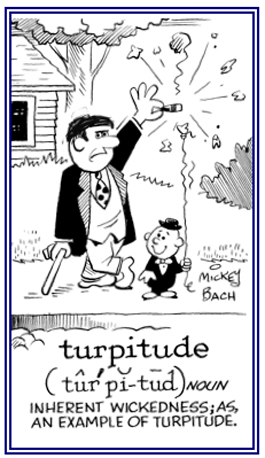2. Extreme immorality or wickedness: Because of his acts of corruptions and turpitudes, Gerald was immediately thrown out of his position as mayor of the city.
3. Vile, shameful, or corrupt behavior: Because of his prior conduct in business regarding his turpitudes, Robin had very little chances of finding any kind of profitable employment.
4. Inherent baseness or vileness of principle in the human heart; extreme wickedness: At the end of the novel Roy was reading, the hero in the story killed the villain who was known for his many turpitudes and evil behaviors.

Go to this Word A Day Revisited Index
so you can see more of Mickey Bach's cartoons.
2. A quality of dishonesty or other immorality that is determined by a court to be present in the commission of a criminal offense; a crime involving moral turpitude.
3. Crimes involving moral turpitude have an inherent quality of baseness, vileness, or depravity with respect to a person's duty to another or to society in general. Examples include rape, forgery, robbery, and solicitation by prostitutes.
These laws are usually applicable only to United States law
Many jurisdictions impose penalties, such as deportation of aliens and disbarment of attorneys, following convictions of crimes involving moral turpitude.
Whether a criminal offense involves moral turpitude is an important determination in deportation, disbarment, and other disciplinary hearings.
Past crimes involving moral turpitude usually may also be introduced as evidence to impeach testimony. Theft, perjury, vice crimes, bigamy, and rape have generally been found to involve moral turpitude, while liquor law violations and disorderly conduct generally have not.
Legal definitions
A term of frequent occurrence in statutes, especially those providing that a witness' conviction of a crime involving moral turpitude may be shown as tending to impeach his credibility.
In general, it means neither more nor less than "turpitude"; that is, anything done contrary to justice, honesty, modesty, or good morals.
It is also commonly defined as an act of baseness, vileness, or depravity in the private and social duties which a man owes to his fellow man or to society in general; contrary to the accepted and customary rule of right and duty between man and man.
Although a vague term, it implies something immoral in itself, regardless of its being punishable by law. Thus excluding unintentional wrong, or an improper act done without unlawful or improper intent.
It is also said to be restricted to the gravest offenses, consisting of felonies, infamous crimes, and those that are malum in se ("wrong in itself" or "inherently and essentially evil") and disclose a depraved mind.
